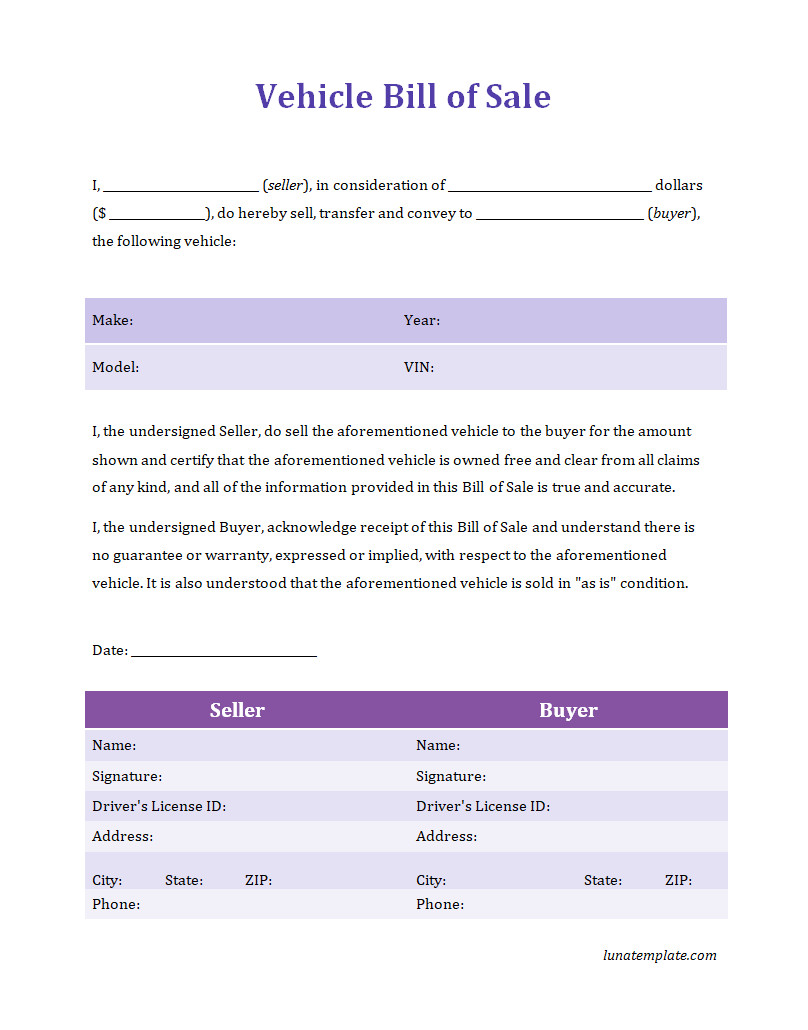When buying or selling a vehicle between two private parties, it is important to have a documented record of the transaction. This is where a vehicle bill of sale comes into play.
A bill of sale is a legal document that proves the transfer of ownership from the seller to the buyer. It includes important information about the vehicle, such as the make, model, year, VIN, and the purchase price.
What Is a Bill of Sale for a Vehicle?
A bill of sale for a vehicle is a written agreement between the seller and the buyer that outlines the terms of the sale. It serves as proof of ownership and protects both parties involved in the transaction. This document is crucial for the buyer to establish legal ownership and to register the vehicle in their name. It also protects the seller by releasing them from any future liability regarding the vehicle.
When a vehicle is sold privately, it is important to have a bill of sale to protect both the buyer and the seller. Without a bill of sale, the buyer may have difficulty proving ownership and may face challenges when registering the vehicle. On the other hand, the seller may be held responsible for any accidents or damages caused by the buyer if there is no documented proof of the sale.

The Importance of a Bill of Sale
A bill of sale is an essential document for both the buyer and the seller. Here’s why:
1. Proof of Ownership
A bill of sale serves as proof of ownership for the buyer. It establishes their legal right to the vehicle and can be used to register the vehicle in their name. Without a bill of sale, the buyer may have difficulty proving that they are the rightful owner of the vehicle.
2. Defines the Vehicle’s Condition
A bill of sale includes information about the condition of the vehicle at the time of purchase. This can be helpful for the buyer in case they encounter any issues with the vehicle after the sale. It also protects the seller by documenting the condition of the vehicle at the time of sale, preventing any false claims made by the buyer.
3. Protects the Seller from Liability
By having a bill of sale, the seller can protect themselves from any liability regarding the vehicle after the sale. If the buyer causes any accidents or damages, the bill of sale proves that the seller is not legally responsible for any harm or injury caused by the buyer.
4. Protects the Seller’s Auto Insurance Company
A bill of sale also protects the seller’s auto insurance company from any accident claims. If the buyer gets into an accident with the vehicle and the insurance company is unaware of the sale, the seller may still be held responsible for any damages or injuries. However, with a bill of sale, the insurance company can be notified of the change in ownership, protecting the seller from any future claims.
How to Write a Bill of Sale for a Vehicle
Writing a bill of sale for a vehicle is a relatively simple process. Here are the key steps to follow:
1. Gather Information
Collect all the necessary information about the vehicle, including the make, model, year, VIN, and mileage. You should also have the buyer’s and seller’s names, addresses, and contact information.
2. Include Specific Details
In the bill of sale, include specific details about the vehicle, such as its condition, any known defects, and any warranties or guarantees that are being provided by the seller.
3. State the Purchase Price
Clearly state the agreed-upon purchase price for the vehicle. This should be in both written form and numerical form to avoid any confusion.
4. Sign and Date the Document
Both the buyer and the seller should sign and date the bill of sale to make it legally binding. It is also a good idea to have a witness present who can also sign the document.
5. Keep Copies
Make sure to keep multiple copies of the bill of sale for both the buyer and the seller. These copies will serve as proof of the transaction and can be used for future reference.
Who Keeps The Bill of Sale?
Both the buyer and the seller should keep a copy of the bill of sale. It is important for the buyer to keep a copy as proof of ownership and for registration purposes. The seller should also keep a copy for their records and to protect themselves from any future liability or claims.
Conclusion
A vehicle bill of sale is an essential document when buying or selling a vehicle between two private parties. It protects both the buyer and the seller by establishing proof of ownership, defining the vehicle’s condition at the time of purchase, and releasing the seller from any future liability.
By following the necessary steps to write a bill of sale and keeping copies for both parties, the transaction can be completed smoothly and legally.
Vehicle Bill of Sale Template – Word